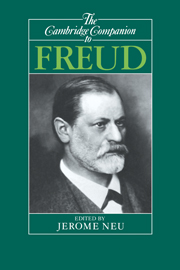Book contents
- Frontmatter
- Introduction
- 1 Freud: The psychoarcheology of civilizations
- 2 Seduced and abandoned: The rise and fall of Freud's seduction theory
- 3 Freud's androids
- 4 The interpretation of dreams
- 5 The unconscious
- 6 The development and vicissitudes of Freud's ideas on the Oedipus complex
- 7 Freud and perversion
- 8 Morality and the internalized other
- 9 Freud on women
- 10 Freud and the understanding of art
- 11 Freud's anthropology A reading of the “cultural books”
- 12 Freud's later theory of civilization
- 13 In fairness to Freud: A critical notice of The Foundations of Psychoanalysis, by Adolf Grünbaum
- Bibliography
- Cited works of Freud
- Index
- Series list
4 - The interpretation of dreams
Published online by Cambridge University Press: 28 May 2006
- Frontmatter
- Introduction
- 1 Freud: The psychoarcheology of civilizations
- 2 Seduced and abandoned: The rise and fall of Freud's seduction theory
- 3 Freud's androids
- 4 The interpretation of dreams
- 5 The unconscious
- 6 The development and vicissitudes of Freud's ideas on the Oedipus complex
- 7 Freud and perversion
- 8 Morality and the internalized other
- 9 Freud on women
- 10 Freud and the understanding of art
- 11 Freud's anthropology A reading of the “cultural books”
- 12 Freud's later theory of civilization
- 13 In fairness to Freud: A critical notice of The Foundations of Psychoanalysis, by Adolf Grünbaum
- Bibliography
- Cited works of Freud
- Index
- Series list
Summary
The Interpretation of Dreams is often regarded as Freud's most valuable book, and it was pivotal in his work.
Freud began his psychological investigations by following up an insight of his senior colleague Joseph Breuer. One of Breuer's patients was a very intelligent and articulate young woman diagnosed as hysterical. Breuer inquired into her symptoms in great detail, and discovered that they were connected with her emotional life in a number of ways.
In particular, she and Breuer could often trace the beginning of a symptom to an event that had been significant to her but that she had forgotten. Where this was so, moreover, the symptom itself could be seen to be connected with feelings related to this event, which she had not previously expressed. Such symptoms thus had a meaningful connection with events and motives in the patient's life. And they were relieved when she brought these events to consciousness and felt and expressed the motives connected with them.
She was, for example, afflicted for some time with an aversion to drinking, which persisted despite "tormenting thirst." She would take up the glass of water she longed for, but then push it away "like someone suffering from hydrophobia." Under hypnosis she traced this to an episode in which a companion had let a dog - a "horrid creature" - drink water from a glass. She relived the event with great anger and disgust; and when she had done so, the aversion ceased, and she was able to drink without difficulty.
- Type
- Chapter
- Information
- The Cambridge Companion to Freud , pp. 86 - 135Publisher: Cambridge University PressPrint publication year: 1991
- 5
- Cited by

